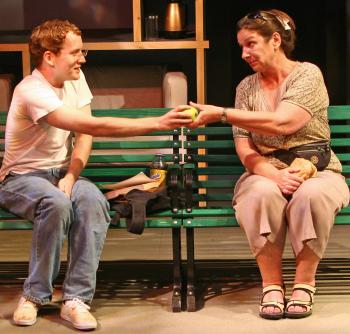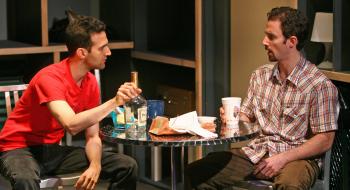Involving and amusing
NEW YORK—Life, the possibilities it holds and the price it exacts—this theme is constantly present in Series A of “Summer Shorts 2: A Festival of New American Short Plays.” The quality of the works presented varies, but each has something to make it worth seeing.
First up is “The Waters of March” by Leslie Lyles. This one-person piece features Amy Irving as Arriana, a world-famous cabaret singer who finds her career beginning to lose its luster. (She was unceremoniously dumped from her latest gig and nobody bothered to tell her). Also, her personal life is completely empty (kind of like unraveling a gigantic ball of yarn only to find nothing at the end of it, as she notes at one point). She also envies the lifestyle of her old friends who decided to settle down, marry, and raise families.
As the piece progresses, the irony of the work comes through. This was a woman who all her life chose to go her own way and live on her own terms yet now, despite the fame and acclaim her career has brought her, feels emotionally empty and totally alone.
Irving brings a quiet dignity to the character. She wishes things could be different but accepts what is, rather than what could be. Revealing early on her decision for being in this particular place at this particular time, she decides to deal with the problem the only way she knows how—by her own timeline. The work is nicely directed by Billy Hopkins, with musical accompaniment by Paul Megna.
Life’s possibilities are examined from different angles in Eduardo Machado’s “Crossing The Border.” Manuel (Gio Perez) is a young Mexican youth who prefers reading to sports, and science and math to trying to hit a baseball. But it is in the latter direction his father Jacinto (Mando Alvarado) pushes him, feeling that only through becoming a world-class athlete can his son get out of Mexico, make the big bucks as a baseball superstar, and avoid being the “failure” his dad sees himself as.
However Manuel doesn’t see his father as a failure, but rather as someone he looks up to, who is always there for him, and whom he loves very much. While Manuel agrees to become a baseball player (rather than follow his true area of interest), he seems to be doing so only to please his dad. And one wonders whether Manuel, if he does fulfill Jacinto’s dreams, will truly be happy. This is an interesting tale of generational priorities nicely brought out in both the text and performances (especially Alvarado’s), with okay direction by Randal Myler.
Easily the most poignant work of the group, and the highpoint of the evening, is Neil Koenigsberg’s “On A Bench.” Robert (David Beck), a 19-year-old student and a child of wealth and privilege, finds his quiet time disrupted when Anne (Mary Joy), a 50-something woman sits down beside him on a New York City park bench.
What starts out as a comic piece about an annoying busybody takes a serious turn when she reveals that she was a witness to a major event in New York City nearly 40 years earlier (one David is reading about), which had far-reaching consequences not only for the city’s social fabric as a whole but also for her entire family. As such, she makes the story come alive in a way David’s book never could.
A tale of looking both forward and backward, Joy is brilliant as a woman who still carries a gaping wound from that not-so-long-ago time and who desperately yearns for a closure that may never come. In contract, Beck nicely portrays the innocence of youth, albeit one fixated too much on the past, so he almost overlooks a piece of “living history.” Good direction by Merri Milwe, strong acting, and a good script make the entire piece come alive.
The evening winds up with Roger Hedden’s “Deep in the Hole,” which looks at four very vapid Midwesterners (David Ross, J.J. Kandel, Kendra Mylnechuk, Emily Tremaine). All in their 20s. The high point of their days is wondering if they should spend an extra $5.00 for a better brand of vodka, talking about the bargains one gets at thrift shops, and the possibilities for hooking up and having sex.
However when the four all meet for the first time, things suddenly go haywire as they become unwitting conspirators in a bioterrorism plot—or do they? Quite funny at points, thanks to a good script and strong chemistry between the foursome, the piece is a satire on empty lives and a question on just how much excitement we really want in our existence. Hopkins, who subtly directed the first work of the evening, displays a looser and more open hand here.
Most importantly, each of the works, none longer than about 20 minutes, could be expanded into a full-length play with additional back stories and characters to flesh out what is shown here. As it is, one is left with interesting glimpses of lives empty or not yet begun, but all of which are unfulfilled to some degree.
The set by Maruti Evans, which reminds one of an Ikea showroom, with various props and set pieces stacked all about waiting to be set up for each specific work, was a nice touch. Lighting (by Evans) worked well, as did the costumes by Michael Bevins and Megan Sanders.
Summer Shorts 2: A Festival of New American Short Plays
Series A
59E59 Theaters
59 East 59th Street
Tickets: 212-279-4200 or www.ticketcentral.com
Closes: Aug. 26, 2008
Running time: Approximately 1 Hour, 40 Minutes
Judd Hollander is the New York correspondent for the London publication, The Stage.










Friends Read Free